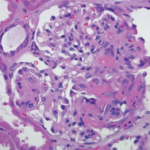4. EGPA & interleukin-5 blockade.
Abstract O-046: Wechsler et al.1
Mepolizumab is the only agent approved by the U.S. Food & Drug Administration (FDA) for the treatment of eosinophilic granulomatosis with polyangiitis (EGPA). MANDARA was a phase 3, randomized controlled trial that randomized 140 patients with relapsing or refractory EGPA to one year of treatment with either benralizumab 30 mg or mepolizumab 300 mg. Both drugs were administered subcutaneously on a monthly basis.
MANDARA demonstrated that benralizumab was non-inferior to mepolizumab for achieving remission at weeks 36 and 48 (59% vs. 56%). However, MANDARA defined remission as a Birmingham Vasculitis Activity Score (BVAS) of 0 and an oral glucocorticoid dose of no more than 4 mg daily. The present study is a post hoc analysis that endeavored to determine if the results might have differed if a more stringent definition of complete remission had been used (i.e., BVAS of 0 and no oral glucocorticoids at weeks 36 and 48). Sustained complete remission was defined as patients who achieved complete remission by week 48 and remained in complete remission by the end of week 52.
Using these new definitions, a greater proportion of patients treated with benralizumab achieved both complete remission (23.5% versus 11.1%) and sustained complete remission (35.7% versus 22.9%) compared to patients treated with mepolizumab.
Mechanistically, benralizumab is more efficient at eliminating eosinophils than mepolizumab. It is, therefore, not surprising that benralizumab was also more efficient at achieving a glucocorticoid-free remission. Importantly, this post hoc analysis highlights that most patients with EGPA treated with IL-5 blockade (either benralizumab or mepolizumab) will continue to require chronic therapy with glucocorticoids, albeit at low doses.
5. Rituximab in Adult-Onset IgA Vasculitis.
Abstract O-084: Triviol et al.1
IgA vasculitis (formerly Henoch Schonlein purpura) is widely considered refractory to immunosuppressive therapies, including cyclophosphamide. Multiple attempts have been made to explore the utility of rituximab for the treatment of IgA vasculitis, with mixed results.
This retrospective study reviewed the kidney response of patients with IgA vasculitis treated with rituximab. Approximately two-thirds of patients had relapsing disease. Most patients also received treatment with glucocorticoids and 15% also received cyclophosphamide.
At six months, 85% of patients were in remission, defined as a BVAS less than three, and 89% of patients with glomerulonephritis demonstrated evidence of improvement. Relapse occurred in 29% of patients a median of 13 months following treatment with rituximab.

